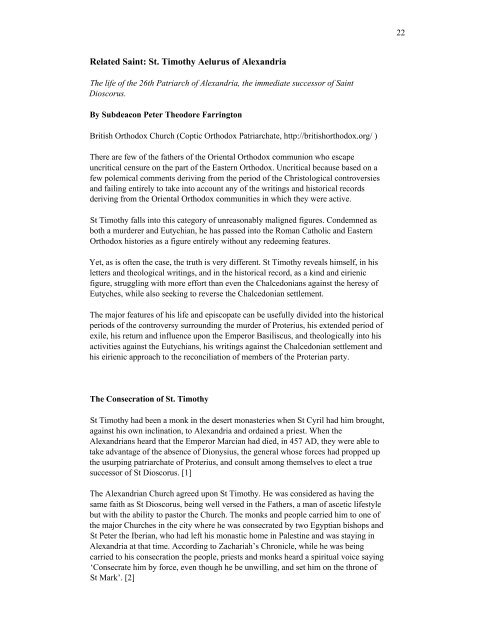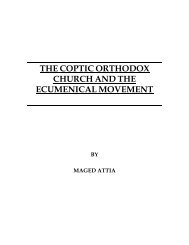Coptic interpretations of the Fourth Ecumenical Council - Saint Mina ...
Coptic interpretations of the Fourth Ecumenical Council - Saint Mina ...
Coptic interpretations of the Fourth Ecumenical Council - Saint Mina ...
You also want an ePaper? Increase the reach of your titles
YUMPU automatically turns print PDFs into web optimized ePapers that Google loves.
Related <strong>Saint</strong>: St. Timothy Aelurus <strong>of</strong> Alexandria<br />
The life <strong>of</strong> <strong>the</strong> 26th Patriarch <strong>of</strong> Alexandria, <strong>the</strong> immediate successor <strong>of</strong> <strong>Saint</strong><br />
Dioscorus.<br />
By Subdeacon Peter Theodore Farrington<br />
British Orthodox Church (<strong>Coptic</strong> Orthodox Patriarchate, http://britishorthodox.org/ )<br />
There are few <strong>of</strong> <strong>the</strong> fa<strong>the</strong>rs <strong>of</strong> <strong>the</strong> Oriental Orthodox communion who escape<br />
uncritical censure on <strong>the</strong> part <strong>of</strong> <strong>the</strong> Eastern Orthodox. Uncritical because based on a<br />
few polemical comments deriving from <strong>the</strong> period <strong>of</strong> <strong>the</strong> Christological controversies<br />
and failing entirely to take into account any <strong>of</strong> <strong>the</strong> writings and historical records<br />
deriving from <strong>the</strong> Oriental Orthodox communities in which <strong>the</strong>y were active.<br />
St Timothy falls into this category <strong>of</strong> unreasonably maligned figures. Condemned as<br />
both a murderer and Eutychian, he has passed into <strong>the</strong> Roman Catholic and Eastern<br />
Orthodox histories as a figure entirely without any redeeming features.<br />
Yet, as is <strong>of</strong>ten <strong>the</strong> case, <strong>the</strong> truth is very different. St Timothy reveals himself, in his<br />
letters and <strong>the</strong>ological writings, and in <strong>the</strong> historical record, as a kind and eirienic<br />
figure, struggling with more effort than even <strong>the</strong> Chalcedonians against <strong>the</strong> heresy <strong>of</strong><br />
Eutyches, while also seeking to reverse <strong>the</strong> Chalcedonian settlement.<br />
The major features <strong>of</strong> his life and episcopate can be usefully divided into <strong>the</strong> historical<br />
periods <strong>of</strong> <strong>the</strong> controversy surrounding <strong>the</strong> murder <strong>of</strong> Proterius, his extended period <strong>of</strong><br />
exile, his return and influence upon <strong>the</strong> Emperor Basiliscus, and <strong>the</strong>ologically into his<br />
activities against <strong>the</strong> Eutychians, his writings against <strong>the</strong> Chalcedonian settlement and<br />
his eirienic approach to <strong>the</strong> reconciliation <strong>of</strong> members <strong>of</strong> <strong>the</strong> Proterian party.<br />
The Consecration <strong>of</strong> St. Timothy<br />
St Timothy had been a monk in <strong>the</strong> desert monasteries when St Cyril had him brought,<br />
against his own inclination, to Alexandria and ordained a priest. When <strong>the</strong><br />
Alexandrians heard that <strong>the</strong> Emperor Marcian had died, in 457 AD, <strong>the</strong>y were able to<br />
take advantage <strong>of</strong> <strong>the</strong> absence <strong>of</strong> Dionysius, <strong>the</strong> general whose forces had propped up<br />
<strong>the</strong> usurping patriarchate <strong>of</strong> Proterius, and consult among <strong>the</strong>mselves to elect a true<br />
successor <strong>of</strong> St Dioscorus. [1]<br />
The Alexandrian Church agreed upon St Timothy. He was considered as having <strong>the</strong><br />
same faith as St Dioscorus, being well versed in <strong>the</strong> Fa<strong>the</strong>rs, a man <strong>of</strong> ascetic lifestyle<br />
but with <strong>the</strong> ability to pastor <strong>the</strong> Church. The monks and people carried him to one <strong>of</strong><br />
<strong>the</strong> major Churches in <strong>the</strong> city where he was consecrated by two Egyptian bishops and<br />
St Peter <strong>the</strong> Iberian, who had left his monastic home in Palestine and was staying in<br />
Alexandria at that time. According to Zachariah’s Chronicle, while he was being<br />
carried to his consecration <strong>the</strong> people, priests and monks heard a spiritual voice saying<br />
‘Consecrate him by force, even though he be unwilling, and set him on <strong>the</strong> throne <strong>of</strong><br />
St Mark’. [2]<br />
22








